The latest community action during a summer of national unrest was organized by the 3/20 Coalition, the advocacy group formed following the 2019 fatal police shooting of Osaze Osagie in State College.
And like the protests and educational events over the past few months, it shined a light on Black men and women shot by police — such as George Floyd, Breonna Taylor and, most recently, Jacob Blake — as well as continuing to emphasize local demands stemming from Osagie’s death.
Osagie, a 29-year-old Black man who was diagnosed with autism and schizophrenia, was shot and killed during a confrontation with State College police who had come to his apartment to serve a mental health warrant. The 3/20 Coalition has since been working for local reforms related to policing, race and mental health.
Protestors march in downtown State College on Saturday, Aug. 29, 2020.Photo by Geoff Rushton | StateCollege.com
State College Borough Council has committed to meeting many of the coalition’s demands, including formation of a community police oversight board. But prior to Saturday’s event, coalition members said none have been truly met yet.
Council said it could not address two demands — the naming of the officers involved in the shooting and financial compensation to the Osagie family — because of ongoing litigation. The Osagies filed a wrongful death lawsuit against the State College Police Department last fall. Coalition members also said there has been no movement toward reallocating police department funds to other programs, which council has pledged to discuss during its 2021 budget planning.
Saturday’s demonstration was billed as “School Is Back in Session, But the Struggle Is Not Over,” and began, as other actions have this summer, at the Allen Street Gates. From there, protestors marched through downtown — at times during brief downpours — to the State College Municipal Building, where they heard from several speakers.
Demonstrators hold signs at the Allen Street Gates on Saturday, Aug. 29, 2020. Photo by Geoff Rushton | StateCollege.com
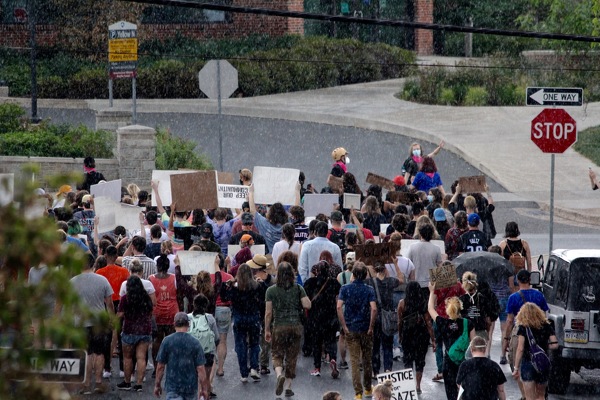
Protestors march during a brief downpour on McAllister Street in downtown State College. Photo by Geoff Rushton | StateCollege.com
Divine Lipscomb, executive director of Corrective Gentlemen, an alternatives to incarceration nonprofit program, and special projects coordinator for the Restorative Justice Initiative at Penn State, said that whether a Black life is taken by a white person or another Black person, “murder is murder.” But the circumstances that follow are often different.
“The difference, for those that can’t seem to wrap their minds around this and why we protest for one more than the other, is rather simple,” he said. “When Black people commit crimes in their neighborhoods, especially murder, they are arrested, tried and convicted in court. They do not get GoFundMe accounts for bail relief or attorney fees. The system nor the community in which they reside, does not rise up and support of their actions.”
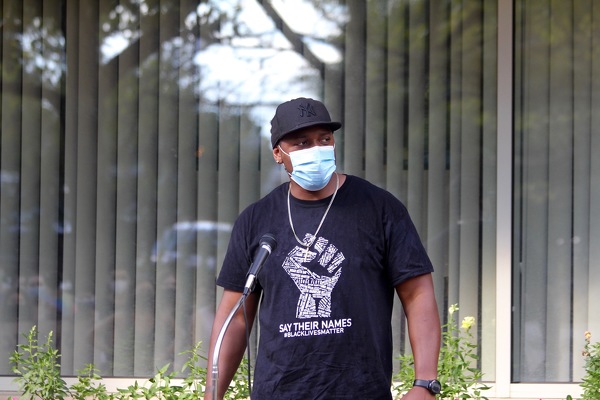
Divine Lipscomb speaks on Aug. 29, 2020 outside of the State College Municipal Building. Photo by Geoff Rushton | StateCollege.com
As with the riots of the 1960s, he said, the unrest today is caused by “discrimination and unfair treatment as well as state-sanctioned white violence.” Narratives around those riots, he added were subsequently used as the premise for over-policing of Black communities, mass incarceration and “unchecked policing powers to people who have been taught to hate and fear poor people.”
“Just like trauma is passed down from generation to generation, so is hate,” Lipscomb said. “But we don’t have to stop there. We can keep mobilizing our money and our people and we can effect change. It might not be today. It might not be tomorrow. Hell, we’re still carrying the same fight from the 60s. But eventually we see small areas of progress and it will change. We just keep moving forward and we keep staying vigilant in our fight for justice and freedom, and I promise you our children will see that day.”
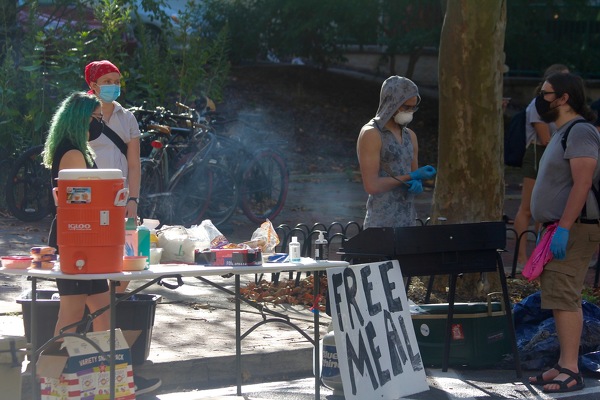
Volunteers prepared free food for participants in a march and teach-in for racial justice on Aug. 29, 2020 on South Allen Street in State College.Photo by Geoff Rushton | StateCollege.com
Kiana Coleman, a member of Penn State’s Black Graduate Student Association, said she is “exhausted” and often at a loss for words, but she will continue to speak out.
“…There are generations before me that have done work, that have laid out the foundations for the work we’re still continuing today because shit hasn’t changed,” she said. “I’m sure they were tired too. Probably more tired than me. I won’t use my excuse of being tired to not show up, because I have a duty to abide by, for myself and for my beautiful Black people. Our generation, we’ve got a lot of work to do. We’ve got a lot of organizing to do, a lot of mobilizing to do. We’ve got to make a lot more people uncomfortable. We’ve got to make a lot more noise.
“I’m going to keep showing up to do the work, to use my voice, to be heard, to be here for the people who can’t be here.”
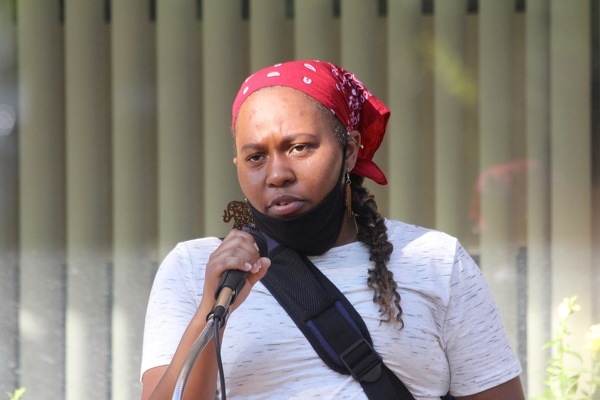
Kiana Coleman, a member of Penn State’s Black Graduate Student Association, speaks on Aug. 29, 2020 outside of the State College Municipal Building. Photo by Geoff Rushton | StateCollege.com
Gabriel Green, a doctoral student in English and African American and Diaspora Studies at Penn State, said he does not necessarily want “to tailor my humanity to somebody else’s perspective,” but feels he has to redirect his message for people to understand the movement is not just for Black people.
Like the civil rights progress that has come before, he said, the ongoing calls for racial justice are meant to be progress for everyone with common ground.
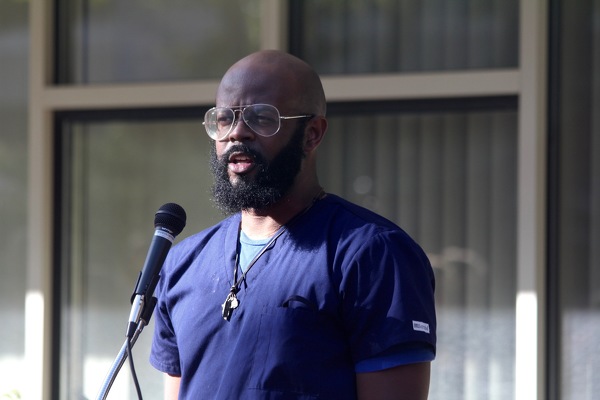
Gabriel Green, a Penn State doctoral student, speaks on Aug. 29, 2020 outside of the State College Municipal Building. Photo by Geoff Rushton | StateCollege.com.
“Yes, we want justice for Black lives, but realize, white people, this is for you too,” said Green. “When we’re saying these things, it’s not just for us. Sure, I want to live. It would be nice to not hold my breath when the car is behind me… but understand when we talk about the carceral state, when we talk about the prison-industrial complex, when we talk about the school-to-prison pipeline we’re not just talking about Black people. We’re talking about your kids, your sisters, your brothers, your parents, your family members…
“Get on the train with us. Understand that our salvation means salvation for you too.”
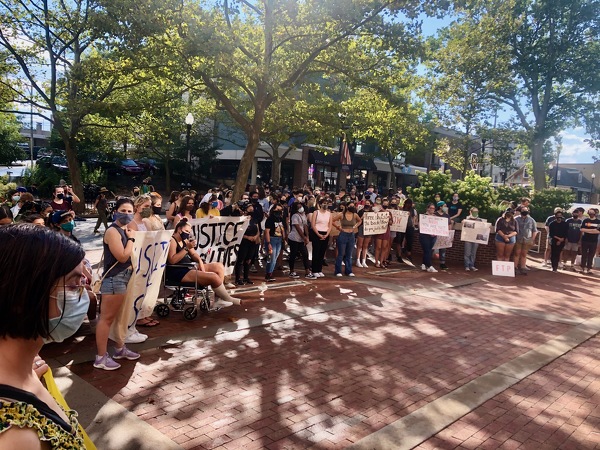
Community members listen to speakers outside of the State College Municipal Building during a racial justice teach-in on Aug. 29, 2020. Photo by Geoff Rushton | StateCollege.com
. . . . . . . . . . . . . . . . . . . . . . . . . . . . . . . . . . .
